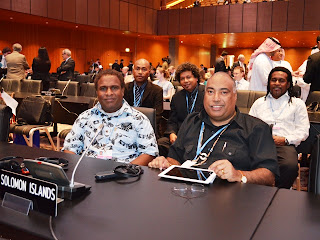 |
| The Prime Minister of Samoa (middle) Head of the delegation of Samoa at COP 18, Doha |
Statement by Hon. Tuilaepa Lupesoliai Sailele
Malielegaoi Prime Minister of Samoa
Mr.
President,
Distinguished
Delegates,
Invited
Guests,
Ladies
and Gentlemen.
I
want to place on record my delegation’s deepest appreciation to the Government
and people of the State of Qatar for being gracious hosts.
Global
warming is the greatest challenge to mankind. It is an existential threat and
an issue of survival, especially for populations of low-lying islands who had
long felt and experienced the impacts of climate change.
Durban
produced a delicately-balanced deal last year to help address the threat of
climate change, in the post-Kyoto Protocol period, and beyond. There were
agreements and understandings reached in good faith, as part of the package.
Doha was expected to deliver a Second Commitment period of the Kyoto Protocol, to
wrap up the parallel Convention track negotiations on long-term cooperative
actions, and to progress and consolidate the Durban Platform negotiations for a
new global climate policy architecture.
Doha
however was not meant to reinterpret and renegotiate the Durban deal, as last
week’s talks showed. In fact, one or two timelines had shifted, and some hard
fought gains by some groups seemed to have been lost. The intransigent positions
of others are stalling agreement on an ambitious plan to fight global warming.
These are unhelpful and self-centered. Yet the gravity and the immediacy of
climate change compel us to be decisive and be forward-looking. It forces us to
step outside of our comfort zones to take a long hard look at ourselves and
others, and the reality of the world we live in. The inaction and indifference
to the plight of those vulnerable to the impacts of climate change, and the least
capable to respond effectively because of a misplaced sense of some that there
is somehow insulation from such risks, only makes the goal of curbing climate
change more difficult and more expensive. Time is running out.
The
World Bank report released last month revealed some sobering and frightening
truths. The world is on a path to a 4 degree Celsius warmer world by the end of
the century. And a series of scientific reports are forecasting similar
scenarios unless bold actions are taken today, not tomorrow, and by everyone,
not just a few. The dire consequences now predicted will also unavoidably be
given focus in the Third Conference on SIDS that Samoa hosts in 2014.
Mr.
President,
It
is this clear urgency and the unsatisfactory state of the global response to
climate change so far that prompts Samoa to try and be represented at the
highest political level at the Conference of the Parties and all related
meetings. As has been obvious for a long time now, increased ambition must
underpin the whole of the climate change negotiations. But it should not be an
exclusive domain to mitigation efforts only. We strongly support the call for
ambitious mitigation targets pre-2020 and post 2020 with a legally binding
Second Commitment period under the Kyoto Protocol. But we also want parties to
be just as ambitious in the provision of climate resources to benefit
adaptation and mitigation activities equally, together with technology that are
appropriate and affordable and the setting up of an appropriate mechanism to
deal with loss and damage.
Mr.
President,
The
First Commitment period of the Kyoto Protocol, an important milestone in the
history of the global climate regime, will end on December 31st.
While we were hopeful that more states parties would join a Second Commitment
period, obviously this will not be the case.
Given
this reality and the uncertainty in the level of ambitions starting 2013, for
Samoa, the focus should not be on whether one’s pledges or commitments will be
made under the Kyoto Protocol or the Framework Convention, the real test for
all of us is how to find a way to ensure that there is ambitious and meaningful
emission reductions irrespective of where they are anchored. We see
complimentary activities in the same vein as long as they are additional to
existing pledges and can meaningfully contribute to reducing the ambition gap.
Mr.
President,
Climate
change is a global problem beyond the capacity of any one country or group of
countries to solve successfully. Only a concerted global effort of states and
their stakeholders working in genuine partnerships, where every input is valued
and appreciated no matter how modest or insignificant it may appear, can we
stand a chance of success. This is shared responsibility to act together to
deal with the climate crisis according to one’s own capabilities.
Our
message is simple and genuine.
We
want to be part of the climate change solution and to make positive
contributions to the global effort. Being a small isolated island country with a
limited resource-base has never been an excuse not to do our bit. Although the
size of our effort maybe be very small at the global scale it is nevertheless
significant compared to the size of our country and economy. Very importantly,
we continue to try and show through modest examples the critical nature of the
collective effort and commitment required from all countries if we are to
succeed in turning around climate change.
While
Samoa has acted domestically to do our part to contribute to the global
response to climate change, it is only through partnerships with sympathetic
countries and their willingness to act ambitiously domestically themselves that
could make possible the magnitude of the response needed to address the
catastrophic consequences of climate change now irrefutably predicted by
science.
Thank you.




